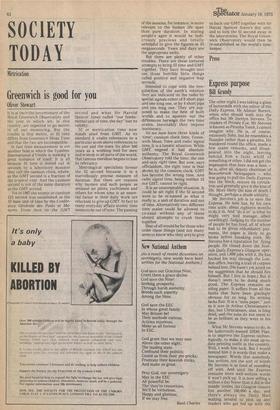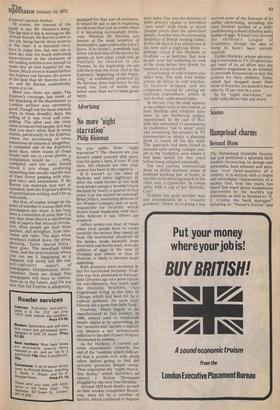Express purpose
Bill Grundy
The other night I was taking a glass of buttermilk with the editor of the Daily Express, Mr Alistair Burnet, when who should walk into the office but Mr Jocelyn Stevens. To readers of Private Eye, Mr Stevens is known as Piranha Teeth. I cannot imagine why. He is, of course, extremely fishy, but he resembles a flounder rather than a piranha. He wandered round the office, made a few inane remarks, and disappeared into the night, leaving behind him a faint whiff of something or other. I did not get the impression that here was a man — he is, after all, deputy chairman of Beaverbrook Newspapers — who was going to pull the Daily Express into the black, restore its circulation and generally give it the kiss of life. More likely the kiss of death I thought, perhaps a shade unfairly.
Mr Stevens's job is to save the Express. He now has, by his own time scale, about eighteen months to do it in. And "do it in" is what he might very well manage, albeit unwillingly. Judging by the number of people he has fired, all Of whom had to be given redundancy payments, the paper is likely to go broke before breaking even. Mr Stevens has a reputation for firing people. He closed down the Scottish Daily Express's Glasgow operation, and 1,800 jobs with it. He has hacked his way through the London office, leaving a trail of corpses behind him. (He hasn't yet acted on my suggestion that he should fire himself. But I live in hope.) But it doesn't seem to be doing much good. The Express remains an ailing paper. It suffers from all the faults that have been glaringly obvious for so long. Its writing lacks flair. It is a "subs paper," just as it was in Arthur Christiansen's day, but Christiansen, alas, is long dead, and the subs do not seem to be as brilliant as they were in his time.
What Mr Stevens wants to do, in his ludicrously-named DX80 Plan, is to improve the Express technologically, to make it the most up-todate printing outfit in the country. Well, I wish him luck. But I would remind him it is words that make a newspaper. Words that somebody has written, not the sort of words Mr Stevens is so fond of sounding off with. And until the Express contains more well-written words it won't pick up. It is now selling a million a day fewer than it did in the middle 'sixties, the Glasgow closure lost another 100,000 a day, and there's always the Daily Mail waiting around to pick up any readers who get fed up with the
Express's ancient format.
Of course, the content of the Paper is not Mr Stevens's baby. The lap that it lies in belongs to Mr Alistair Burnet. Mr Burnet is new to the job, being barely three months in the chair. It is therefore early days to judge him, but one can at least say that the much-welcomed improvement in the character of the leading articles is not enough to make one all that hopeful for the future. Much more is wanted before the Express can become the power in the land that Mr Stevens sees it as, and Mr Burnet undoubtedly wants it to be.
Mind you, there are signs. The Express's coverage, last week, of the hijacking of the Manchester to London airliner was extremely good. Though not the most unusual story in these dreadful days, the telling of it was vivid and compelling. The pilot and the crew came across as real people; in a way that you don't often find in news stories, particularly in the Express, Where the processing of news sometimes de-natures it altogether. It reminded one of the Express's great days, when teams of chaps would rush out to cover stories, a
compilation would be . . well, compiled, and the subs would knock it into shape, producing something that usually had the rest of Fleet Street gasping with mingled envy and amazement. If Mr Burnet can maintain that sort of standard, then the Express's dearth of good feature writing won't be so noticeable.
But that, of course, brings up the point of whether it is news that sells newspapers any more. It has long been a contention of mine that it is not; that these days it is the feature
• Side of papers that attracts circulation. Most people get their news quicker, and straighter, from television and radio. The days when newsboys rushed down the street Shouting, "Extra. Special Extra," have gone. The newsflash killed them. And the news bulletin, where You can see it happening as it happens, will surely kill the redhot-topicalityo f aspect
newspapers. Interpretation, entertainment, these are things that newspapers will have to concentrate on in the future. And I'm not sure that the Express is adequately
equipped for that sort of existence. It would be sad to see it regaining its old news flair just at a time when it is becoming increasingly irrelevant. Whether Mr Stevens, not known as the most sensitive of wordsmiths, appreciates this I don't know. If he doesn't, somebody had better tell him that all the money he spends on new plant could just as fruitfully be chucked in the Thames. In the beginning, we are told there was the word. And in the Express's "beginning of the beginning," so confidently predicted by Mr Stevens, there had better be the word, too. Lots of words. And better ones than we've been given lately.



































 Previous page
Previous page